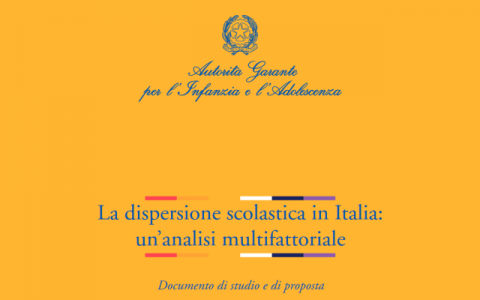
On the website of the Guarantor Authority for Childhood and Adolescence (Agia), the study and proposal document "Droping out in Italy: a multifactorial analysis" is online. This publication reports the results of a survey on the phenomenon promoted by the Authority. The final report was drafted by a committee consisting of representatives from academia, education and Agia.
"Droping out, beyond its numerical representation", reads the document, "is a complex phenomenon that involves different dimensions of the social life of the child and the community in which he or she lives: from early childhood services to vocational training, from social policies to housing and employment. Related factors may be unemployment, social exclusion and poverty conditions, but neither can reasons attributable to personal and/or family hardship, learning difficulties and, more generally, the way the individual student reacts to the school system be excluded. Other causes, which should not be underestimated, can be attributed to individual reasons that can push individuals towards dropping out of school early and, among these, considerable weight is attributed to anxiety disorders."
The results of the survey show that students from more vulnerable family, cultural and social backgrounds perform worse at school and are more exposed to the risk of dropping out: 22.7% of the children of those with at most a secondary school leaving certificate fail to graduate and about 22% of school leavers have parents with unskilled or unemployed occupations. Among foreign pupils, the dropout rate is three times that of Italians (9.1% versus 2.9%). In general, the gaps between North and South are wide, and even access to nurseries does not prevail for those who need it most, such as poor families.
According to the report, the fight against early school leaving is based on three axes: combating the factors that cause educational poverty, failure and early school dropout; prevention; and promoting the factors that contribute to school success.
The fifth chapter of the book contains a series of recommendations addressed by the Supervisory Authority for Children and Adolescents to institutions, businesses, social partners, professional bodies and the third sector: among these, to invest in the integrated system of socio-educational services and zero-six educational services; to strengthen the orientation of students from the first cycle of education; to intervene on the basic skills of the adult population as a prerequisite for creating the family conditions necessary to combat school dropout; to ensure integrated governance and a consistent evaluation of educational and social policies necessary to support a National Strategy for preventing and combating school dropout and for school success.
The publication is available in the dedicated news item and in the "Publications" section of the Authority's website.
Other materials and news can be found on this site under the topic Dropping out, accessible from the "Themes" navigation menu.

